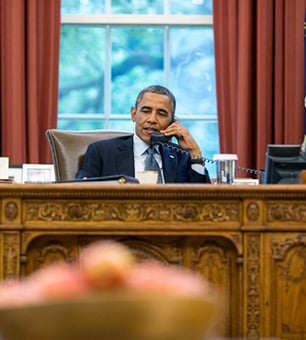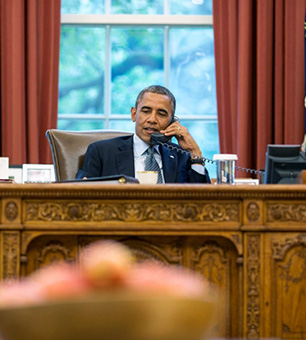 (Photo: Pete Souza / White House)President Barack Obama’s administration announced Thursday morning that it will aggressively fight the Supreme Court’s recent ruling striking down a key part of the Voting Rights Act in a series of legal cases across the nation.
(Photo: Pete Souza / White House)President Barack Obama’s administration announced Thursday morning that it will aggressively fight the Supreme Court’s recent ruling striking down a key part of the Voting Rights Act in a series of legal cases across the nation.
“Based on the evidence of intentional racial discrimination….as well as the history of pervasive voting-related discrimination against racial minorities that the Supreme Court itself has recognized – we believe that the State of Texas should be required to go through a preclearance process whenever it changes its voting laws and practices,” according to a copy of Attorney General Eric Holder’s prepared remarks to the National Urban League National Conference.
His full remarks on the issue are below:
Last month, the United States Supreme Court issued a deeply disappointing – and flawed – decision that struck down a key part of the Voting Rights Act of 1965 – the cornerstone of modern civil rights law. This landmark protection – which was signed into law by President Lyndon Johnson, and was reauthorized by overwhelming, bipartisan Congressional majorities as recently as 2006 – included a provision that allowed the Justice Department to take action against any covered jurisdiction that adopted voting rules or procedures with either a discriminatory purpose or effect.
For nearly five decades, this requirement – called “preclearance” – served as a potent tool for addressing inequities in our election systems. Although preclearance originated during the Civil Rights Movement – and was informed by a history of discrimination – the conduct that it was intended to address continues to this day. Preclearance has proven to be an effective mechanism that puts on hold any new voting changes until they have been subjected to a fair, and thorough, review. This process regularly resulted in approvals for impartial voting changes. But it also allowed the Justice Department to work with covered jurisdictions to address problems wherever they occurred – protecting the ability of all eligible citizens to participate in the process of self-governance.
In fact, just last year, a federal court noted the “vital function” the Voting Rights Act played in protecting African American voters who would have been disproportionately impacted by a photo ID law in South Carolina. It prompted the state to change the way its new voting statute will be implemented in future elections to eliminate what would have been a dramatic discriminatory effect. Another court cited the Voting Rights Act in blocking a Texas congressional redistricting map that would have discriminated against Latino voters. And in that ruling, the court noted that the parties “provided more evidence of discriminatory intent than we have space, or need, to address here.”
As these and many other cases demonstrate; as too many voters have seen firsthand; and as every member of the Supreme Court acknowledged in the Shelby decision – in the words of the Chief Justice: “voting discrimination still exists: no one doubts that.” Although mandated by the Constitution, voting rights are not always guaranteed – in practice – without robust enforcement. That’s why, despite the Court’s decision, I believe we must regard this setback not as a defeat, but as an historic opportunity: for Congress to restore, and even to strengthen, modern voting protections.
After all, this has never been a partisan issue. Every reauthorization of the Voting Rights Act was signed into law by a Republican president. It’s a question of our values as a nation. It goes to the heart of who we are as a people. And it’s incumbent upon Congressional leaders from both parties to guarantee that every eligible American will always have equal access to the polls; to ensure that we will never turn our back on the hard-won progress of the last hundred years; and to consider new solutions that are equal to the challenges of the 21st century.
As this debate unfolds, it’s important for all Americans to note that – despite the Supreme Court’s flawed ruling – our voting rights remain fully intact.
It is the responsibility of every member of this organization – and every citizen of this country – to keep defending their rights by exercising them, by registering to vote, by going to the polls on Election Day, and by casting a ballot for their preferred candidates of any political party. Never forget that an involved and concerned electorate can overcome any amount of money the special interests might spend in trying to shape our nation to suit their narrow vision.
And it is the duty of today’s Justice Department to continue monitoring jurisdictions around the country for changes that may hamper these voting rights. To keep taking appropriately aggressive action against any jurisdiction that attempts to hinder free and fair access to the franchise. And to keep refining and re-focusing current enforcement efforts – while we work with Congress to craft stronger tools for protecting voting rights.
With these goals in mind, I have already directed the Department’s Civil Rights Division to shift resources to the enforcement of a number of federal voting laws not affected by the Supreme Court’s decision – including the remaining provisions of the Voting Rights Act, prohibiting voting discrimination based on race, color, or language.
And today I am announcing that the Justice Department will ask a federal court in Texas to subject the State of Texas to a preclearance regime similar to the one required by Section 5 of the Voting Rights Act. This request to “bail in” the state – and require it to obtain “pre-approval” from either the Department or a federal court before implementing future voting changes – is available under the Voting Rights Act when intentional voting discrimination is found. Based on the evidence of intentional racial discrimination that was presented last year in the redistricting case, Texas v. Holder – as well as the history of pervasive voting-related discrimination against racial minorities that the Supreme Court itself has recognized – we believe that the State of Texas should be required to go through a preclearance process whenever it changes its voting laws and practices.
This is the Department’s first action to protect voting rights following the Shelby County decision, but it will not be our last. Even as Congress considers updates to the Voting Rights Act in light of the Court’s ruling, we plan, in the meantime, to fully utilize the law’s remaining sections to ensure that the voting rights of all American citizens are protected. My colleagues and I are determined to use every tool at our disposal to stand against discrimination wherever it is found. But let me be very clear: these remaining tools are no substitute for legislation that must fill the void left by the Supreme Court’s decision. This issue transcends partisanship, and we must work together. We cannot allow the slow unraveling of the progress that so many, throughout history, have sacrificed so much to achieve. And, in our broader efforts, we will continue to look far beyond America’s ballot boxes – to our schools, military bases, and border areas; our immigrant communities, our criminal justice system, and even our workplaces – in order to advance the fight for equality and against injustice.
As the National Urban League understands better than most, this fight also extends to every segment of our workforce and every sector of our economy – because our country is strongest when every American has a fair shot at economic opportunity. This is why the Justice Department is moving aggressively to guard against financial fraud, to ensure robust competition, and to hold accountable all those who would undermine the integrity of our housing and lending markets. It’s also why the Administration as a whole will continue to advance the priorities that President Obama laid out in Illinois yesterday afternoon – not just to create jobs in the near term, but to invest in our future – and build on the 40 straight months of economic growth we’ve seen.
Angry, shocked, overwhelmed? Take action: Support independent media.
We’ve borne witness to a chaotic first few months in Trump’s presidency.
Over the last months, each executive order has delivered shock and bewilderment — a core part of a strategy to make the right-wing turn feel inevitable and overwhelming. But, as organizer Sandra Avalos implored us to remember in Truthout last November, “Together, we are more powerful than Trump.”
Indeed, the Trump administration is pushing through executive orders, but — as we’ve reported at Truthout — many are in legal limbo and face court challenges from unions and civil rights groups. Efforts to quash anti-racist teaching and DEI programs are stalled by education faculty, staff, and students refusing to comply. And communities across the country are coming together to raise the alarm on ICE raids, inform neighbors of their civil rights, and protect each other in moving shows of solidarity.
It will be a long fight ahead. And as nonprofit movement media, Truthout plans to be there documenting and uplifting resistance.
As we undertake this life-sustaining work, we appeal for your support. We have 8 days left in our fundraiser: Please, if you find value in what we do, join our community of sustainers by making a monthly or one-time gift.
